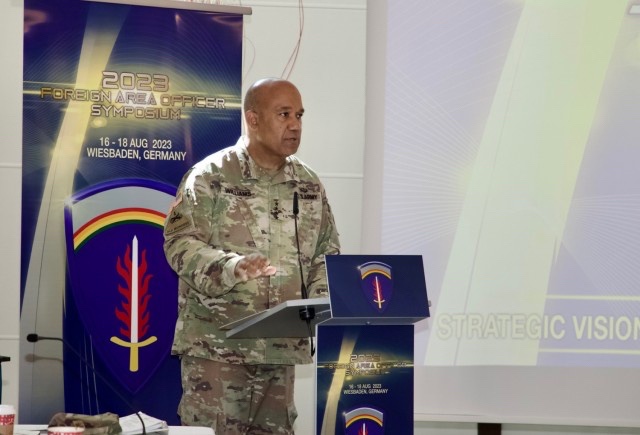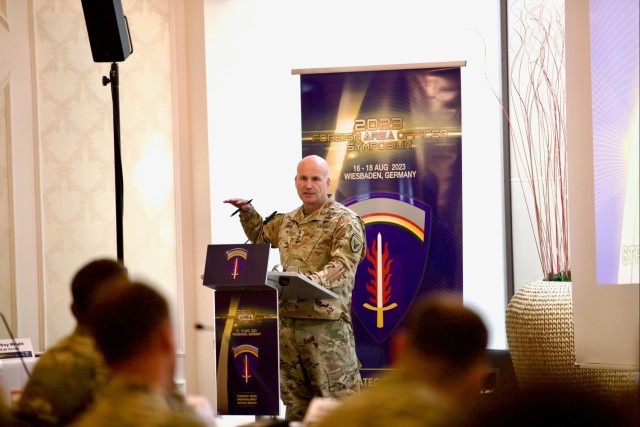
WIESBADEN, Germany – More than 200 leaders from across Europe attended the fourth annual Foreign Area Officer Symposium on Clay Kaserne, Aug. 16-18.
The symposium provided a venue for FAOs to network, improve their understanding of U.S. military equities, exchange information, and improve professional capacities, in order to strengthen connections and European security throughout the U.S. European Command area of responsibility.
“In our very small global world, partnerships and alliances are key to success,” said Gen. Christopher Cavoli, the Commander of U.S. European Command, and Supreme Allied Commander Europe. “Working with allies and partners is extremely important for achieving U.S. national security objectives in this theater and globally.”
USAREUR-AF leaders led participants in panels on threat security, defense strategies and plans, capabilities development, and the shared understanding of the Army Campaign Plan.
“You have to be a communicator across national alliances, across U.S. organizations and national lines, you have to have the skills to develop and cultivate relationships,” Cavoli said, speaking directly to the FAOs gathered. “Your personality, reputation, and integrity as a Soldier is more important than your position or title and is directly tied to your effectiveness.”
FAOs are commissioned officers selected from any of the six branches of the United States Armed Forces. In 1997, the U.S. Army transformed the FAO branch into a single-track career field, allowing them the concentration needed to become regional experts, specializing in political-military operations. They possess a unique combination of strategic focus, regional expertise, with political, cultural, sociological, economic and geographic awareness, and foreign language proficiency. There are more than 1,000 FAOs serving in more than 150 countries around the world. They are commissioned officers deliberately selected, trained, educated, and developed to meet worldwide Department of Defense requirements.

“FAOs are often called strategic scouts because they work independently and in complex forward situations,” said General Darryl Williams the Commanding General of U.S. Army Europe and Africa, and the Commander of NATO’s Allied Land Command. “The FAOs in this theater are no exception. They provide a key element that allows us to of our Allies and partners; a deeper understanding providing key elements and strengthening their abilities to conduct the large-scale operations and training across Europe.”
FAOs have extensive roles and varied responsibilities, and serve in overseas assignments such as military attachés, security cooperation officers, or as a political-military planners in a service’s headquarters, joint staff, geographic combatant commands, or in agencies of the Department of Defense. They provide expedited communication connections with Allies and partners to coordinate foreign military sales, policies, cooperative research, military training for partner nation service members, and engage in diplomatic meetings between military leaders.
“Each FAO has individualized experiences working in various embassies, and through these symposiums, they are able to connect and share combined experiences with others in the career field,” Lt. Col. Oksana Grisko said, a FAO and Branch Chief for the Central European region in the International Operations Division at U.S. Army Europe and Africa.
The symposium addressed major efforts made to improve upon a shared understanding of how FAOs are shaping the European security environment.
“The FAOs who work for the embassies, and in the USAREUR-AF headquarters, facilitate contact with our Allies and partners – we do that on a day-to-day basis,” Grisko said. “From a security standpoint, and from the Department of Defense standpoint, we’re on the front line, FAOs continually push the importance of the Allies and partners and continued support to the alliance.”
For more information on U.S. Army Europe and Africa please visit: www.europeafrica.army.mil
By Casey Slusser

